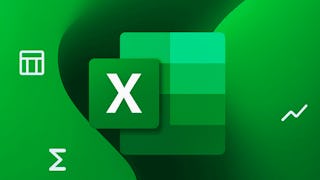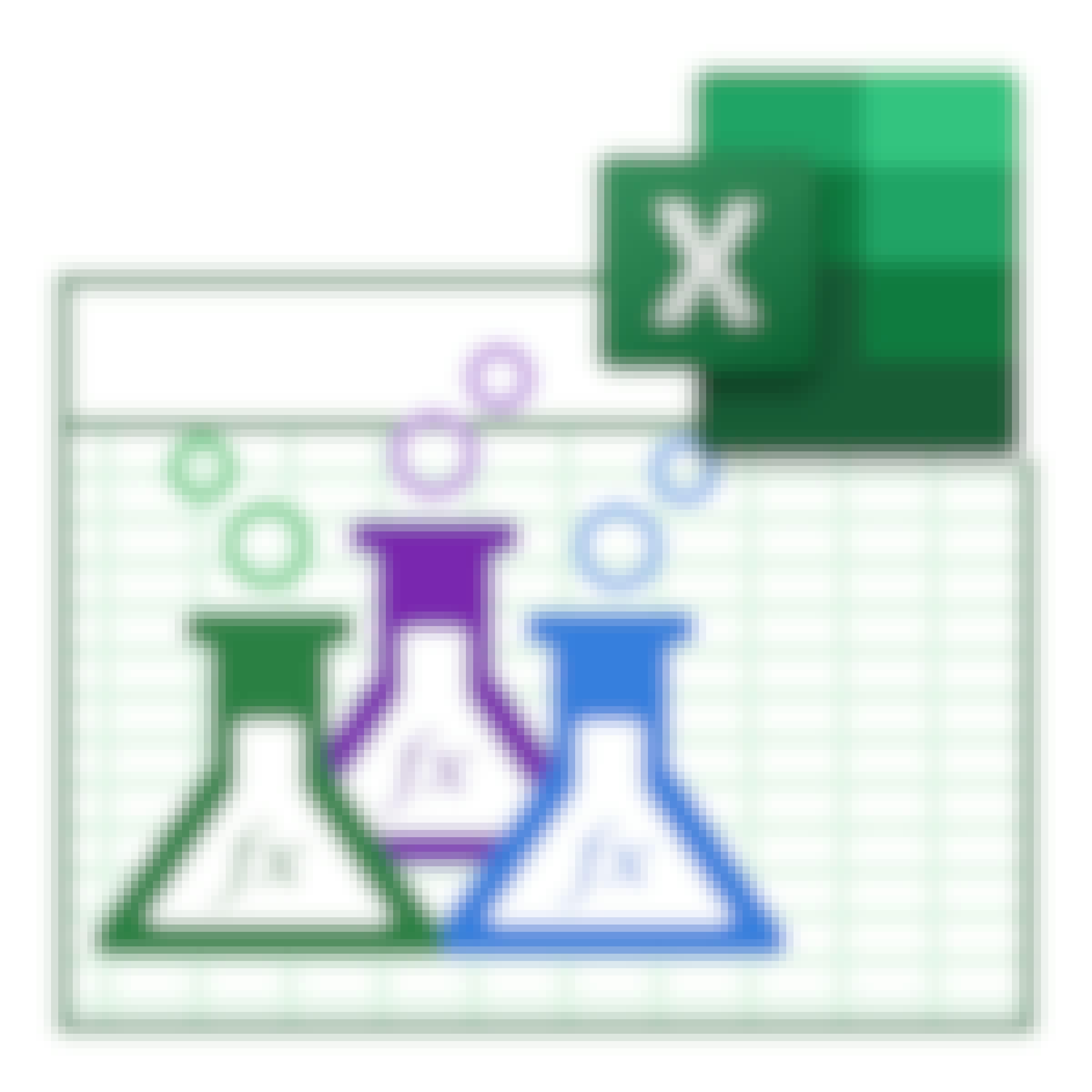- Browse
- Excel Basics
Results for "excel basics"
 Status: Free TrialFree Trial
Status: Free TrialFree TrialSkills you'll gain: Excel Formulas, Microsoft Excel, Data Cleansing, Data Analysis, Data Import/Export, Spreadsheet Software, Data Wrangling, Data Quality, Pivot Tables And Charts, Google Sheets, Data Manipulation, Data Science, Information Privacy
4.7·Rating, 4.7 out of 5 stars11K reviewsBeginner · Course · 1 - 3 Months
 C
CCoursera
Skills you'll gain: Microsoft Excel, Excel Formulas, Spreadsheet Software, Microsoft Office, Data Entry, Microsoft 365
4.6·Rating, 4.6 out of 5 stars14K reviewsIntermediate · Guided Project · Less Than 2 Hours
 Status: NewNewStatus: Free TrialFree TrialK
Status: NewNewStatus: Free TrialFree TrialKKnowledge Accelerators
Skills you'll gain: Power BI, Data Presentation, Data Modeling, Data Visualization, Microsoft Excel, Data Visualization Software, Dashboard, Business Intelligence, Pivot Tables And Charts, Data Import/Export, Excel Formulas, Spreadsheet Software, Interactive Data Visualization, Data Analysis Expressions (DAX), Data Transformation, Data Analysis, Data Storytelling, Analytics, Trend Analysis, Data Management
4.5·Rating, 4.5 out of 5 stars1.7K reviewsBeginner · Specialization · 3 - 6 Months

Skills you'll gain: Excel Formulas, Spreadsheet Software, Microsoft Excel, Microsoft 365, Data Analysis, Gross Profit, Business Mathematics
4.6·Rating, 4.6 out of 5 stars2.5K reviewsBeginner · Guided Project · Less Than 2 Hours

Skills you'll gain: Microsoft Excel, Excel Formulas, Spreadsheet Software, Pivot Tables And Charts, Data Analysis, Data Manipulation, Microsoft Office, Data Mining
4.7·Rating, 4.7 out of 5 stars4.5K reviewsIntermediate · Guided Project · Less Than 2 Hours
 Status: Free TrialFree TrialM
Status: Free TrialFree TrialMMacquarie University
Skills you'll gain: Excel Formulas, Dashboard, Microsoft Excel, Spreadsheet Software, Excel Macros, Data Preprocessing, Data Literacy, Data Validation, Data Manipulation, Data Presentation, Data Storytelling, Data Analysis Software, Microsoft Office, Data Analysis Expressions (DAX), Business Analytics, Pivot Tables And Charts, Financial Forecasting, Data Modeling, Analytical Skills, Advanced Analytics
4.9·Rating, 4.9 out of 5 stars63K reviewsBeginner · Specialization · 3 - 6 Months
What brings you to Coursera today?
 Status: Free TrialFree TrialM
Status: Free TrialFree TrialMMicrosoft
Skills you'll gain: Microsoft Excel, Excel Formulas, Data Visualization, Spreadsheet Software, Microsoft Office, Microsoft 365, Productivity Software, Data Import/Export, Data Management
4.7·Rating, 4.7 out of 5 stars3.2K reviewsBeginner · Course · 1 - 3 Months
 Status: Free TrialFree TrialM
Status: Free TrialFree TrialMMacquarie University
Skills you'll gain: Excel Formulas, Microsoft Excel, Spreadsheet Software, Microsoft Office, Data Analysis Expressions (DAX), Productivity Software, Data Analysis Software, Business Analytics, Analytical Skills
4.9·Rating, 4.9 out of 5 stars51K reviewsBeginner · Course · 1 - 3 Months
 Status: Free TrialFree TrialU
Status: Free TrialFree TrialUUniversity of Colorado Boulder
Skills you'll gain: Microsoft Excel, Excel Formulas, Regression Analysis, Data Validation, Pivot Tables And Charts, Spreadsheet Software, Data Management, Data Visualization Software, Data Entry, Statistical Modeling, Data Cleansing, Financial Analysis, Predictive Modeling, Financial Modeling, Data Analysis Expressions (DAX), Data Import/Export, Analysis, Mathematical Modeling, Complex Problem Solving, Problem Solving
4.7·Rating, 4.7 out of 5 stars4.1K reviewsBeginner · Specialization · 3 - 6 Months
 Status: NewNewStatus: Free TrialFree Trial
Status: NewNewStatus: Free TrialFree TrialSkills you'll gain: Microsoft Excel, Pivot Tables And Charts, Excel Formulas, Spreadsheet Software, Business Reporting, Data Visualization, Excel Macros, Dashboard, Forecasting, Data Analysis, Data Visualization Software, Predictive Modeling, Data Validation, Productivity Software, Data Entry, Data Management, Financial Modeling, Data Security, Data Integrity, Computer Literacy
4.8·Rating, 4.8 out of 5 stars111 reviewsBeginner · Specialization · 1 - 3 Months

Skills you'll gain: Excel Formulas, Spreadsheet Software, Microsoft Excel, Microsoft Office, Data Analysis
4.8·Rating, 4.8 out of 5 stars388 reviewsBeginner · Guided Project · Less Than 2 Hours
 Status: Free TrialFree TrialV
Status: Free TrialFree TrialVVanderbilt University
Skills you'll gain: Excel Macros, Excel Formulas, Microsoft Excel, Data Visualization, ChatGPT, Spreadsheet Software, AI Enablement, Data Validation, Prototyping, Data Import/Export
4.8·Rating, 4.8 out of 5 stars71 reviewsBeginner · Course · 1 - 4 Weeks
What brings you to Coursera today?
In summary, here are 10 of our most popular excel basics courses
- Excel Basics for Data Analysis: IBM
- Getting Started with Microsoft Excel: Coursera
- Excel to Power BI: Data Analysis & Business Intelligence: Knowledge Accelerators
- Using Basic Formulas and Functions in Microsoft Excel: Coursera
- Introduction to Data Analysis using Microsoft Excel: Coursera
- Excel Skills for Business: Macquarie University
- Work Smarter with Microsoft Excel: Microsoft
- Excel Skills for Business: Essentials: Macquarie University
- Everyday Excel: University of Colorado Boulder
- Microsoft Excel Mastery: From Basics to Pro Skills: EDUCBA
Frequently Asked Questions about Excel Basics
Excel Basics refers to the fundamental knowledge and skills required to effectively use Microsoft Excel, a popular spreadsheet program. It involves understanding the basic features and functionalities of Excel, such as creating and formatting spreadsheets, inputting data, using formulas and functions, sorting and filtering data, creating charts and graphs, and performing basic data analysis. Excel Basics is essential for individuals who want to manage data efficiently, organize information, perform calculations, and present data visually.
To have a solid foundation in Excel Basics, you should focus on learning the following skills:
Understanding the Excel Interface: Familiarize yourself with the different menus, ribbons, and tools available in Excel.
Cell Formatting: Learn how to format cells to effectively present and organize data by adjusting font styles, cell borders, colors, and alignment.
Data Entry and Editing: Master techniques for entering, editing, and deleting data within individual cells or ranges of cells.
Formulas and Functions: Gain proficiency in using basic Excel formulas (e.g., SUM, AVERAGE, MAX, MIN) and functions to perform calculations and automate tasks.
Sorting and Filtering: Learn how to sort and filter data to quickly analyze and extract specific information from large datasets.
Charts and Graphs: Acquire the skills to create visually appealing charts and graphs to represent data trends and patterns.
Conditional Formatting: Explore how to apply conditional formatting rules to highlight specific data based on predefined criteria.
Working with Worksheets: Understand how to create, delete, rename, and move between multiple worksheets within an Excel workbook.
Collaboration and Sharing: Discover how to collaborate with others on Excel files, share workbooks, and protect data with passwords.
- Data Analysis Tools: Familiarize yourself with Excel's data analysis tools, such as PivotTables and PivotCharts, to summarize and analyze complex data.
Remember, these skills serve as a foundation for Excel Basics and can be further enhanced as you progress in your Excel proficiency.
With Excel Basics skills, you can pursue a variety of job opportunities across industries. Some common job roles that require Excel proficiency include:
Data entry specialist: Excel is extensively used for data entry and management tasks. As a data entry specialist, you would be responsible for inputting and organizing data using Excel spreadsheets.
Administrative assistant: Many administrative roles require Excel skills to efficiently manage and analyze data, create reports, and perform data entry tasks.
Financial analyst: Excel is a crucial tool for financial analysis, budgeting, and forecasting. With Excel skills, you can pursue a career as a financial analyst, where you will use Excel to analyze financial data, build financial models, and generate reports.
Project coordinator: Excel helps in project planning, tracking progress, and managing budgets and resources. As a project coordinator, you can utilize Excel skills to create and update project plans, track milestones, and analyze project data.
Sales representative: Excel is valuable for managing customer data, tracking sales performance, and creating sales reports. With Excel proficiency, you can excel in a sales role by effectively utilizing Excel for data analysis and reporting.
Human resources assistant: HR professionals often use Excel for tracking employee data, managing recruitment processes, and analyzing HR metrics. With Excel skills, you can work as an HR assistant and efficiently handle various HR tasks.
Research analyst: Excel is essential for organizing and analyzing research data, generating insights, and creating reports. As a research analyst, you would use Excel to collect, clean, and analyze data for research purposes.
- Marketing coordinator: Excel can assist in organizing marketing campaign data, tracking metrics, and analyzing campaign performance. With Excel skills, you can work as a marketing coordinator and effectively track marketing activities and report on their success.
These are just a few examples, but Excel skills can be beneficial in numerous other roles that involve data analysis, reporting, and organization.
People who work with data or numbers on a regular basis, such as analysts, accountants, financial professionals, or anyone who wants to improve their data management and analysis skills.
Here are some topics related to Excel Basics that you can study:
Excel Interface: Learn about the different elements of the Excel interface such as ribbon, worksheets, columns, rows, and cells.
Basic Formulas and Functions: Understand the fundamentals of Excel formulas and functions, including arithmetic operations, SUM, AVERAGE, COUNT, MAX, MIN, IF statements, and more.
Managing Worksheets: Learn techniques to create, delete, rename, and navigate between worksheets.
Formatting Cells: Explore how to format cells in Excel, including changing font styles, sizes, colors, cell alignment, borders, and applying number formatting.
Working with Data: Understand different techniques to enter, edit, and manipulate data in Excel, including sorting, filtering, and using Autofill.
Creating Charts and Graphs: Learn how to visually represent data using charts and graphs in Excel, including creating bar graphs, line graphs, pie charts, and more.
Conditional Formatting: Discover how to apply conditional formatting to highlight specific data based on predefined rules or conditions.
Working with Formulas and Functions: Dive deeper into Excel formulas and functions, including absolute and relative cell references, nested functions, and logical functions like IF, AND, OR.
Data Analysis Tools: Explore Excel's data analysis tools such as sorting, filtering, data validation, pivot tables, and creating basic data models.
- Collaboration and Sharing: Discover how to collaborate with others on Excel workbooks, share files, track changes, and protect sensitive information.
Remember, these topics are just a starting point for your study of Excel Basics, and there is much more to explore within the world of Excel.
Online Excel Basics courses offer a convenient and flexible way to enhance your knowledge or learn new Excel Basics refers to the fundamental knowledge and skills required to effectively use Microsoft Excel, a popular spreadsheet program. It involves understanding the basic features and functionalities of Excel, such as creating and formatting spreadsheets, inputting data, using formulas and functions, sorting and filtering data, creating charts and graphs, and performing basic data analysis. Excel Basics is essential for individuals who want to manage data efficiently, organize information, perform calculations, and present data visually. skills. Choose from a wide range of Excel Basics courses offered by top universities and industry leaders tailored to various skill levels.
When looking to enhance your workforce's skills in Excel Basics, it's crucial to select a course that aligns with their current abilities and learning objectives. Our Skills Dashboard is an invaluable tool for identifying skill gaps and choosing the most appropriate course for effective upskilling. For a comprehensive understanding of how our courses can benefit your employees, explore the enterprise solutions we offer. Discover more about our tailored programs at Coursera for Business here.










